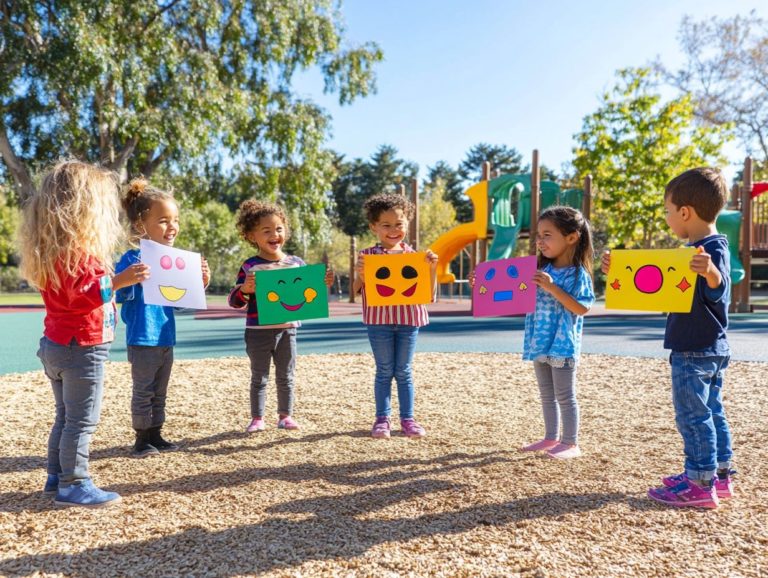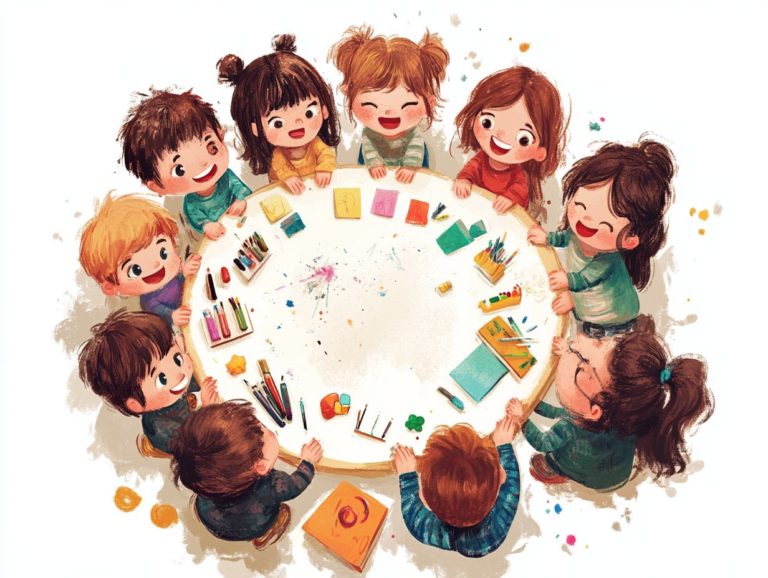Understanding Emotional Awareness in Play Therapy
Emotional awareness plays a crucial role in your child’s development, especially within the realm of play therapy and the child-centered approach.
This discussion delves into the importance of emotional awareness, highlighting its myriad benefits for children and the ways it can be nurtured through various therapeutic techniques. Get ready to discover the different types of play therapy and how each method enhances this awareness while also learning to identify signs of emotional understanding and emotional processing in your child.
We ll examine the challenges that therapists encounter in this journey and provide practical tips for you to support your child’s emotional growth. Uncover the profound connection between play and emotional awareness as you explore these insights, including how play therapy benefits emotional expression and mental health!
Contents
- Key Takeaways:
- What Is Emotional Awareness?
- Why Is Emotional Awareness Important in Play Therapy?
- How Does Play Therapy Facilitate Emotional Awareness?
- What Are the Types of Play Therapy?
- How Does Each Type of Play Therapy Promote Emotional Awareness?
- What Are the Signs of Emotional Awareness in Children?
- How Can Play Therapists Assess Emotional Awareness in Children?
- What Are Some Tips for Parents to Encourage Emotional Awareness in Children?
- Frequently Asked Questions
- What is emotional awareness in play therapy?
- Why is emotional awareness important in play therapy?
- How is emotional awareness developed in play therapy?
- Can emotional awareness in play therapy benefit children with behavioral issues?
- Are there any potential challenges to developing emotional awareness in play therapy?
- Is emotional awareness only important for children in play therapy?
Key Takeaways:
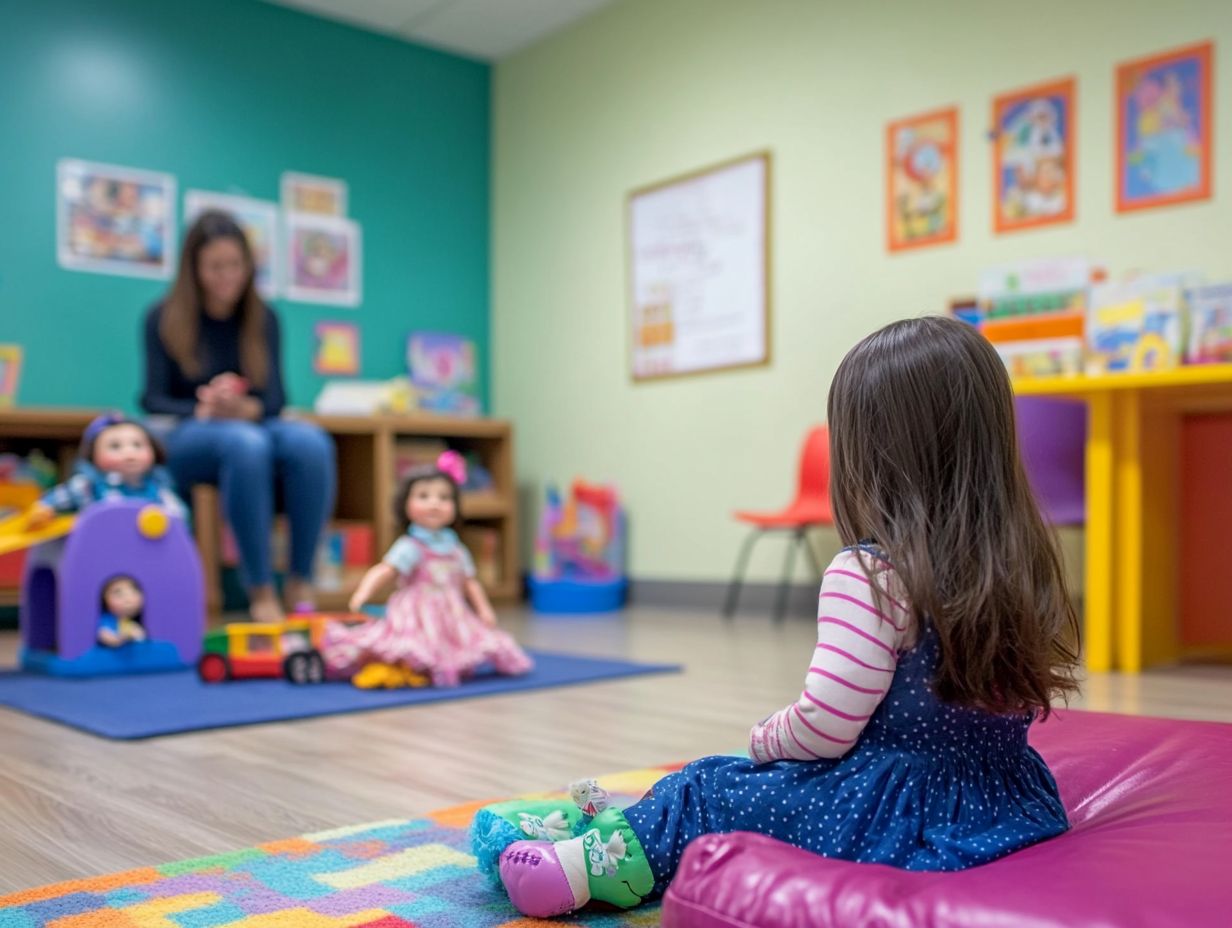
- Emotional awareness is the ability to recognize and understand one’s own emotions and the emotions of others.
- In play therapy, emotional awareness is important for promoting emotional intelligence, self-regulation (managing your own emotions), coping skills, and social skills in children.
- Techniques such as mindfulness, emotion labeling, and role-playing can help cultivate emotional awareness in play therapy, contributing to emotional growth and behavior management.
What Is Emotional Awareness?
Emotional awareness is your capacity to recognize, understand, and manage both your own emotions and those of others. This vital skill significantly influences emotional expression, self-awareness, and overall emotional intelligence. It is particularly important in counseling interventions and therapeutic environments.
By cultivating this foundational aspect of emotional development, you enable yourself to handle your feelings better, enhancing your communication skills and fostering deeper empathy within your personal and family relationships.
This awareness is essential for maintaining healthy emotional regulation and developing effective coping strategies, particularly in therapeutic settings where tailored interventions address emotional challenges and behavioral issues.
Why Is Emotional Awareness Important in Play Therapy?
Emotional awareness plays a crucial role in play therapy, as it enables children to express their feelings, comprehend their emotions, and cultivate coping strategies within a nurturing environment. This process not only promotes mental health but also enhances emotional intelligence and emotional support.
When children acquire these essential skills, they become more adept at confronting emotional challenges, addressing their developmental needs, and nurturing healthy family relationships. Registered play therapists employ a range of therapeutic techniques and professional training designed to facilitate emotional exploration and expression, which significantly aids in trauma recovery (the process of healing from distressing experiences) and behavioral intervention.
What Are the Benefits of Emotional Awareness in Play Therapy?
The benefits of emotional awareness in play therapy are truly remarkable, enhancing emotional growth, equipping you with essential coping mechanisms, and fostering effective behavior management. By honing your emotional awareness, you learn to navigate complex feelings, which leads to improved family relationships.
This is particularly beneficial for children with special needs and autism spectrum disorder. This awareness aids in emotional regulation and allows for healthier responses to emotional challenges, promoting your overall mental health and well-being.
As you engage in therapeutic play, you cultivate enhanced communication skills that enable you to articulate your feelings and thoughts with clarity. This newfound ability enriches your interactions with both peers and adults, fostering greater self-awareness as you begin to recognize your emotional triggers and patterns. Play materials and expressive arts play a significant role in this process.
Developing empathy through play therapy supports deeper connections with others, which is essential for building healthy relationships. These cumulative benefits significantly contribute to trauma recovery, providing a safe environment for you to express yourself and ultimately supporting your emotional and developmental needs in a way that lays a strong foundation for your future. Understanding emotional triggers and emotional coaching are also vital components.
For further support, consider consulting a therapist or exploring more resources related to emotional awareness and play therapy!
How Does Emotional Awareness Help Children in Play Therapy?
Emotional awareness plays a crucial role in enhancing your child’s experience in play therapy. It helps them articulate their feelings, identify emotional triggers, and cultivate effective coping strategies essential for emotional regulation. This is particularly important for childhood therapy and addressing behavioral problems.
This therapeutic approach creates a safe space where your child can delve into imaginative play and expressive arts. They can explore their emotions freely while receiving support from trained professionals. As they navigate this process, your child learns to express their emotional challenges constructively, leading to greater self-awareness and emotional intelligence. Lipscomb University and the Association for Play Therapy endorse this method.
By participating in activities that promote self-expression, your child sharpens their communication skills and begins to grasp the nuances of their own emotions and those of others. This understanding is key in addressing various behavioral issues, equipping them with the tools to articulate their needs instead of resorting to acting out. This approach boosts both emotional and mental health, paving the way for brighter futures!
The compassionate support provided by therapists is instrumental in shaping this emotional awareness. Their guidance helps children grow emotionally healthy, enabling your child to build resilience and forge deeper connections with peers and family. This ultimately fosters a well-rounded growth trajectory. For example, registered play therapist Kim Chaudoin and her team, including Kasie Lee, Ana Kelly, and Billie Graham, have emphasized the importance of this approach in therapeutic settings.
What Are Some Techniques for Cultivating Emotional Awareness in Play Therapy?
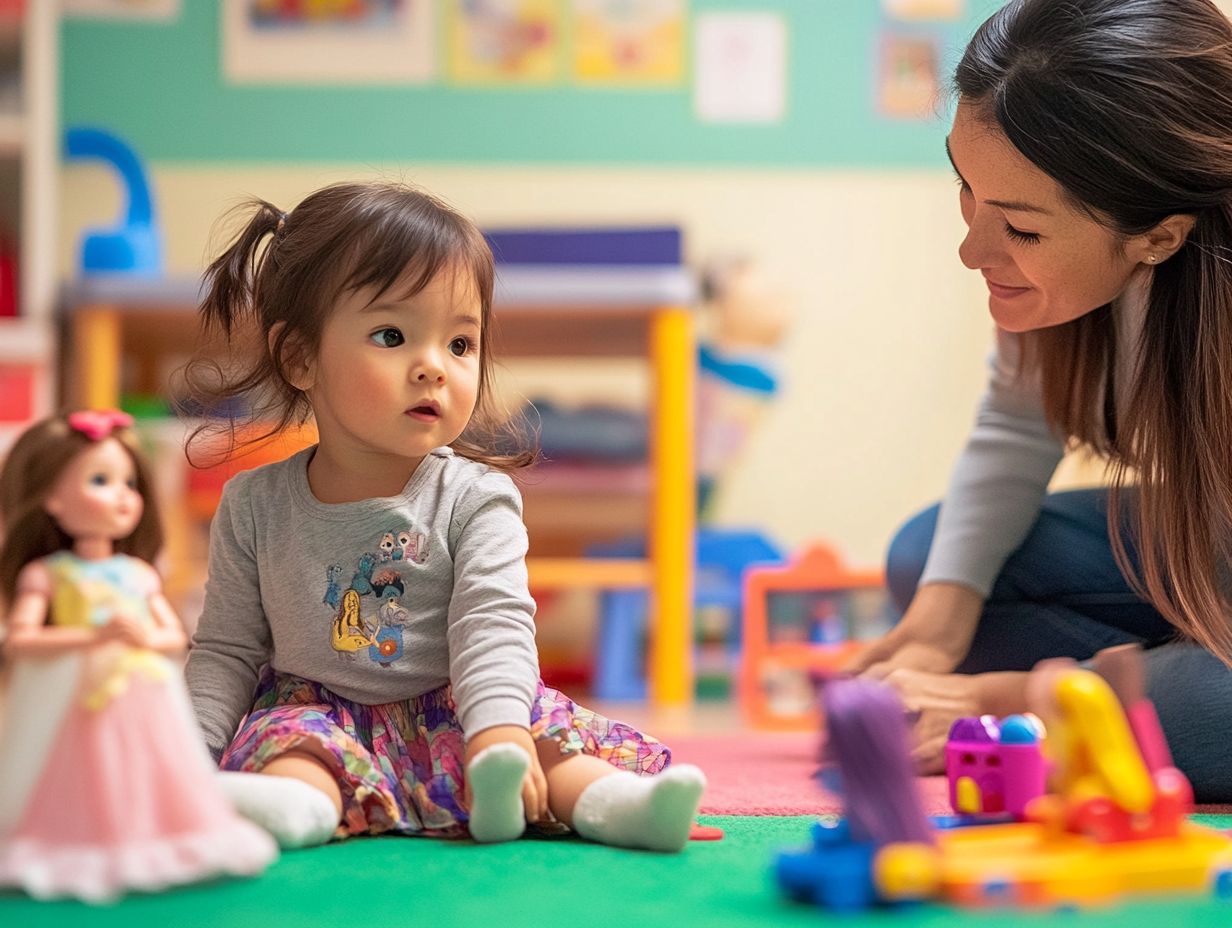
Techniques for cultivating emotional awareness in play therapy encompass expressive arts, narrative therapy, and therapeutic play. These methods encourage the exploration of feelings and provide emotional coaching. They offer children valuable opportunities to express their emotions creatively, fostering a deeper understanding of their emotional landscape. This aligns with the practices promoted during National Play Therapy Week.
By utilizing various play materials and engaging in imaginative play, you can help children enhance their emotional regulation and develop healthier coping strategies for emotional challenges. Professionals like Melissa Hueste Watts and Lisa White Polakowski recommend these methods for effective childhood therapy.
This exploration aids in identifying and articulating feelings while aligning with developmental stages. This ensures that the methods you employ are age-appropriate and resonate with the child’s experiences. Involving family members in this process is vital. When parents and caregivers grasp these techniques, they can replicate them at home, creating a supportive environment that reinforces emotional learning. Such family involvement is crucial for the child’s emotional support and overall well-being.
By practicing together, families can bolster the child’s comfort with emotional expression. This ultimately leads to a more cohesive understanding of emotions inside and outside of therapy sessions. This partnership contributes to healing and growth and strengthens family bonds, creating a nurturing atmosphere for emotional development. Experts such as John Gottman and Janan Cain have emphasized the importance of such family dynamics in emotional coaching and counseling intervention.
How Does Play Therapy Facilitate Emotional Awareness?
Play therapy offers a unique opportunity to enhance emotional awareness in a structured yet safe environment. This allows children to engage in imaginative play and express their emotions without restraint. This approach is particularly recommended for children with special needs to support their emotional and developmental growth.
This therapeutic approach helps children explore their feelings, significantly improving their emotional expression and communication skills.
Through a variety of play activities, they learn to recognize and manage their emotions effectively. This cultivates critical coping skills that are essential for navigating the emotional challenges of everyday life.
In conclusion, emotional awareness is vital in play therapy as it supports children s emotional health. If you believe your child could benefit from these therapies, consider exploring play therapy options today!
What Are the Types of Play Therapy?
You ll find that play therapy encompasses various approaches. Non-directive play therapy helps children express their feelings freely, while directive play therapy involves therapists guiding the play toward specific emotional awareness objectives. This dual approach is essential for addressing varied emotional challenges and behavioral problems.
Each type employs distinct therapeutic techniques tailored to meet children’s developmental needs. These methods facilitate emotional expression and deepen their understanding of feelings. Skilled play therapists utilize these strategies to cultivate a therapeutic environment that encourages growth and healing. For example, the movie Inside Out is often used in narrative therapy to help children understand and articulate their feelings.
In non-directive play therapy, children are invited to engage in spontaneous play, using toys and materials to communicate their thoughts and emotions without limitations. This approach fosters self-discovery and resilience. On the other hand, directive play therapy introduces structured activities like storytelling or role-playing, designed to address specific challenges such as anxiety or trauma.
While both methodologies prove effective, the choice between them often depends on the individual needs and goals of the child. For instance, younger children may thrive in the open-ended nature of non-directive play, while older children might gain valuable insights from the guided exploration of their emotions found in directive methods.
How Does Each Type of Play Therapy Promote Emotional Awareness?
Each type of play therapy uniquely promotes emotional awareness. Non-directive play therapy enables children to express their emotions freely, enhancing their coping strategies and emotional intelligence. In contrast, directive play therapy offers structured interventions aimed at addressing specific emotional challenges.
In the realm of non-directive play, children feel empowered to express their emotions, which enhances their coping strategies and emotional intelligence. Conversely, directive play therapy employs targeted therapeutic approaches to guide children through their emotional experiences, providing deeper insights into their feelings. This method is particularly effective for children dealing with trauma.
Incorporating activities like art creation or role-playing scenarios allows children to explore various emotions in a safe and creative manner. For example, using dolls or action figures to act out different social situations helps children articulate feelings about real-life challenges, while a guided drawing session might reveal emotions that are difficult to verbalize. Such play activities also enhance emotional processing and provide a safe environment for coping strategies.
The flexibility of these methods is truly exciting! They adapt to fit each child’s unique emotional needs, significantly impacting their progress. This adaptability is crucial! It ensures the therapeutic process connects deeply with the child, making them feel seen and heard while fostering a better understanding of their emotional landscape and emotional intelligence.
What Are the Signs of Emotional Awareness in Children?
Signs of emotional awareness in children reveal themselves through a range of behaviors. These include their ability to articulate feelings, demonstrate empathy, and engage in effective communication and social skills.
When children show emotional awareness, they can identify and regulate their emotions. This leads to enhanced emotional expression and self-awareness. These indicators are vital markers of a child’s development, showcasing their ability to navigate social interactions and tackle emotional challenges constructively.
How Can Play Therapists Assess Emotional Awareness in Children?
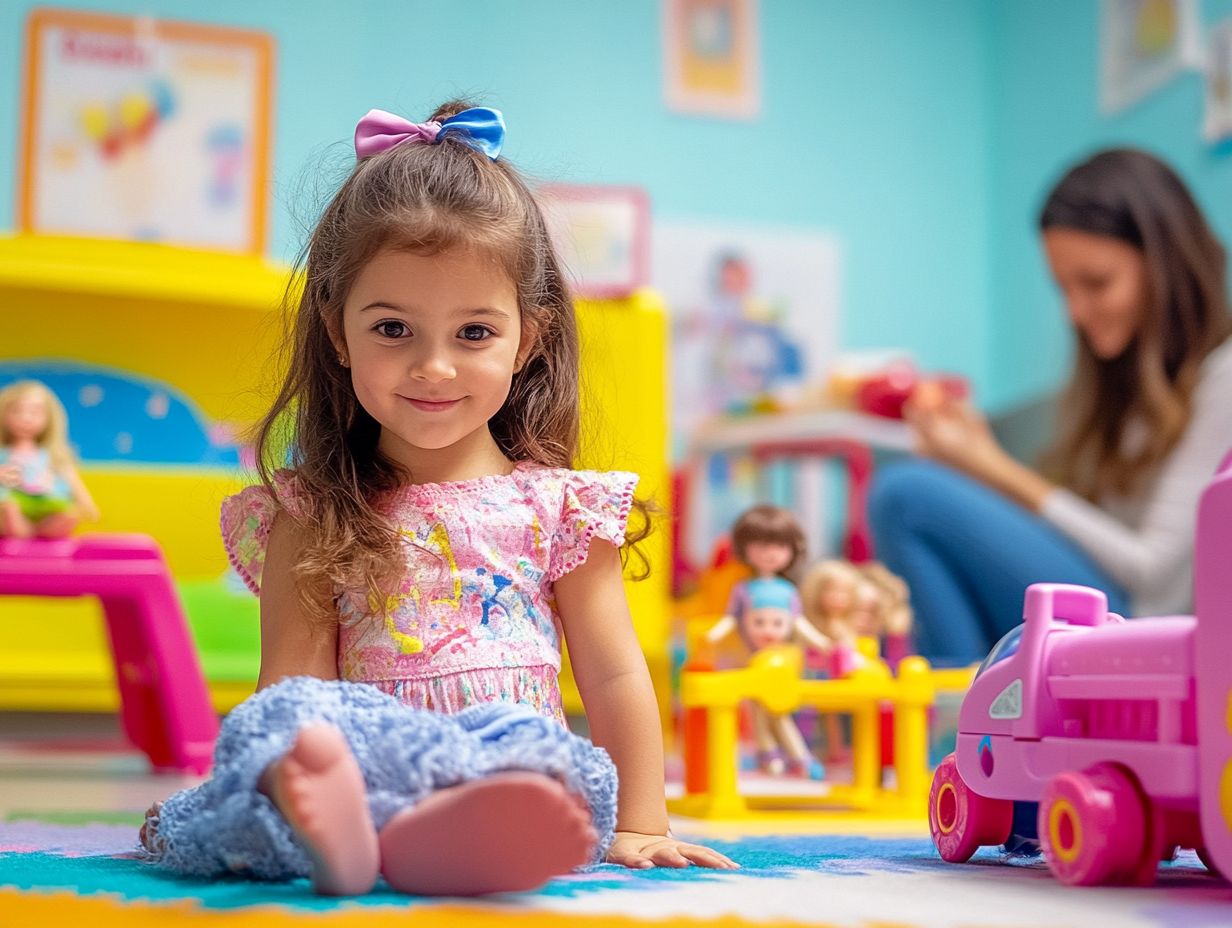
As a play therapist, you assess emotional awareness in children through a blend of observational techniques, therapeutic play, and structured assessments that emphasize emotional expression and behavior management. This process often includes telling stories to help children express their feelings and imaginative play to facilitate deeper emotional exploration.
By keenly observing children s interactions during play activities, you can gain valuable insights into their emotional understanding, coping strategies, and communication skills. These assessments reveal exciting new opportunities for support and growth! They not only illuminate areas where children may require further help but also guide you in crafting tailored therapeutic interventions like behavior management that cater to their individual needs.
What Are the Challenges in Promoting Emotional Awareness in Play Therapy?
Promoting emotional awareness in play therapy brings its own set of challenges. You may find yourself navigating the emotional hurdles that children face, managing behavioral issues, and ensuring that families are adequately involved in the therapeutic journey and trauma recovery.
These obstacles can impede a child’s ability to fully express their emotions, complicating the effectiveness of your interventions. Children exhibit varying levels of emotional intelligence and coping mechanisms. This can make it quite a challenge for play therapists to establish a consistent approach that caters to each child’s unique needs.
How Can Play Therapists Overcome These Challenges?
You can overcome challenges in promoting emotional awareness as a play therapist by employing adaptive therapeutic techniques, fostering strong family involvement, and creating individualized coping strategies tailored to each child.
By actively engaging families in the therapeutic process and providing education on emotional awareness, you can build a supportive network that enhances the child’s emotional growth and developmental needs.
Utilizing diverse therapeutic methods that cater to the child’s unique needs will help you address emotional challenges and facilitate effective emotional expression. Methods such as expressive arts, non-directive play, and a child-centered approach are particularly beneficial.
For instance, incorporating family play sessions not only strengthens familial bonds but also allows you to observe interactions and identify dynamics that may influence the child’s emotional responses. Regularly adjusting your therapeutic methods based on the child’s progress and feedback ensures that your interventions remain relevant and effective.
Specific techniques such as John Gottman‘s emotion coaching or Inside Out-inspired activities can be particularly effective.
Continuous assessment of each child’s emotional needs is crucial. You must stay alert to subtle shifts in feelings and behaviors, enabling a responsive approach that adapts to the evolving landscape of their emotional world. This flexible strategy ultimately builds resilience and fosters a sense of security, enabling children to navigate their emotional experiences with greater ease. Emotional regulation and compassionate support are key components of this process.
What Are Some Tips for Parents to Encourage Emotional Awareness in Children?
You have the opportunity to cultivate emotional awareness in your children by embracing practical strategies that foster emotional expression, refine communication skills, and offer steadfast emotional support, thereby enriching your family relationships.
By establishing a safe space for open discussions about feelings and demonstrating healthy coping mechanisms, you can nurture their emotional intelligence and self-awareness. Engaging in imaginative play and using play materials suggested by Janan Cain or Melissa Hueste Watts can be very effective.
Engaging in activities that explore emotions and encouraging your children to articulate their feelings are vital steps in nurturing their emotional growth. Resources such as Lisa White Polakowski and Ana Kelly‘s work on emotional coaching can be particularly beneficial.
Frequently Asked Questions
What is emotional awareness in play therapy?
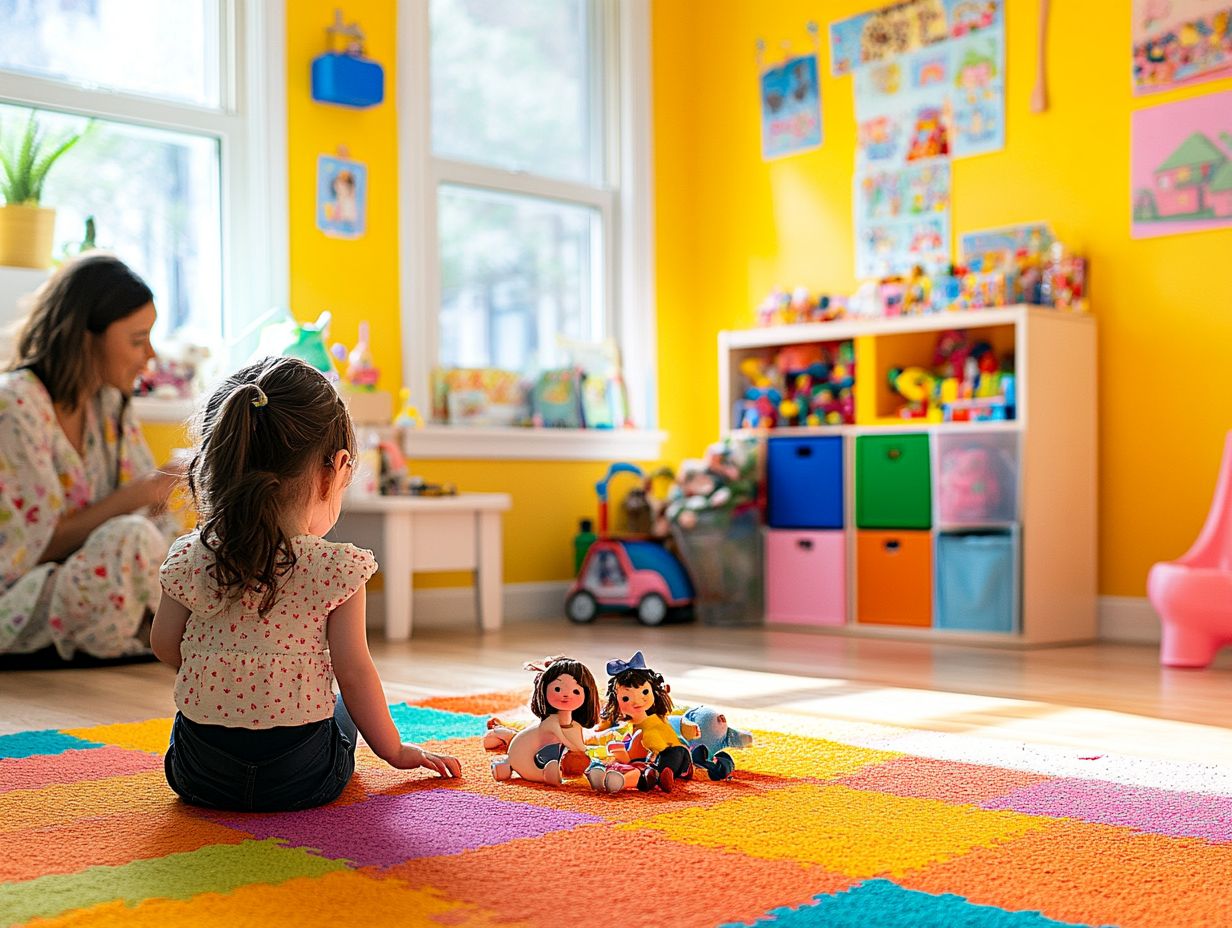
Emotional awareness in play therapy refers to the ability to recognize and understand one’s own emotions and the emotions of others during the therapeutic process. This is often guided by trained therapists who have specialized professional training in childhood therapy.
Why is emotional awareness important in play therapy?
Understanding emotions is vital in play therapy! It allows both the therapist and the child to explore and express emotions in a safe and healthy way. This leads to a deeper understanding and processing of underlying issues.
It also helps address behavioral problems and promotes overall mental health.
How is emotional awareness developed in play therapy?
Emotional awareness is developed in play therapy through various therapeutic techniques such as role-playing, art, and storytelling. These methods encourage the child to express and reflect on their emotions.
Techniques like expressive arts and therapeutic play are particularly effective in this regard.
Can emotional awareness in play therapy benefit children with behavioral issues?
Yes, emotional awareness in play therapy can be especially beneficial for children with behavioral issues. It helps them understand and regulate their emotions, leading to improved behavior and coping skills.
This is essential for children with conditions like autism spectrum disorder or those who have experienced trauma.
Are there any potential challenges to developing emotional awareness in play therapy?
Yes, some children may find it difficult to express or identify their emotions. This can be a challenge in developing emotional awareness in play therapy. A skilled therapist can help the child work through these challenges using methods like empathy building, which helps children feel understood and supported, and counseling intervention.
Is emotional awareness only important for children in play therapy?
The Importance of Understanding Feelings
Understanding feelings is crucial for everyone, especially children in play therapy. It greatly influences their emotional health and growth.
National Play Therapy Week and organizations like the Association for Play Therapy highlight the need for emotional awareness in childhood education.

